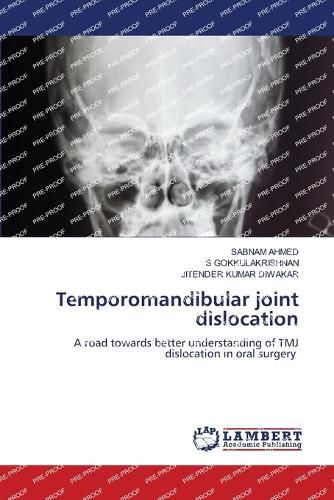Readings Newsletter
Become a Readings Member to make your shopping experience even easier.
Sign in or sign up for free!
You’re not far away from qualifying for FREE standard shipping within Australia
You’ve qualified for FREE standard shipping within Australia
The cart is loading…






Temporomandibular joint (TMJ) dislocation occurs when the jaw joint becomes displaced, leading to difficulty in closing or opening the mouth. This condition can result from various factors, including trauma, excessive yawning, dental procedures, or underlying joint abnormalities. When the TMJ becomes dislocated, it may cause pain, swelling, and limited jaw movement. Patients may experience a clicking or popping sensation in the jaw, and in severe cases, the jaw may become locked in an open or closed position. TMJ dislocation can also lead to headaches, ear pain, and difficulty chewing or speaking.Treatment for TMJ dislocation depends on the severity and underlying cause of the condition. In mild cases, the jaw may be able to be manipulated back into place manually by a healthcare professional. This procedure, known as reduction, is often performed under local anesthesia to alleviate pain and facilitate proper realignment of the joint.In more severe cases or if the dislocation recurs frequently, other interventions may be necessary.
$9.00 standard shipping within Australia
FREE standard shipping within Australia for orders over $100.00
Express & International shipping calculated at checkout
Temporomandibular joint (TMJ) dislocation occurs when the jaw joint becomes displaced, leading to difficulty in closing or opening the mouth. This condition can result from various factors, including trauma, excessive yawning, dental procedures, or underlying joint abnormalities. When the TMJ becomes dislocated, it may cause pain, swelling, and limited jaw movement. Patients may experience a clicking or popping sensation in the jaw, and in severe cases, the jaw may become locked in an open or closed position. TMJ dislocation can also lead to headaches, ear pain, and difficulty chewing or speaking.Treatment for TMJ dislocation depends on the severity and underlying cause of the condition. In mild cases, the jaw may be able to be manipulated back into place manually by a healthcare professional. This procedure, known as reduction, is often performed under local anesthesia to alleviate pain and facilitate proper realignment of the joint.In more severe cases or if the dislocation recurs frequently, other interventions may be necessary.